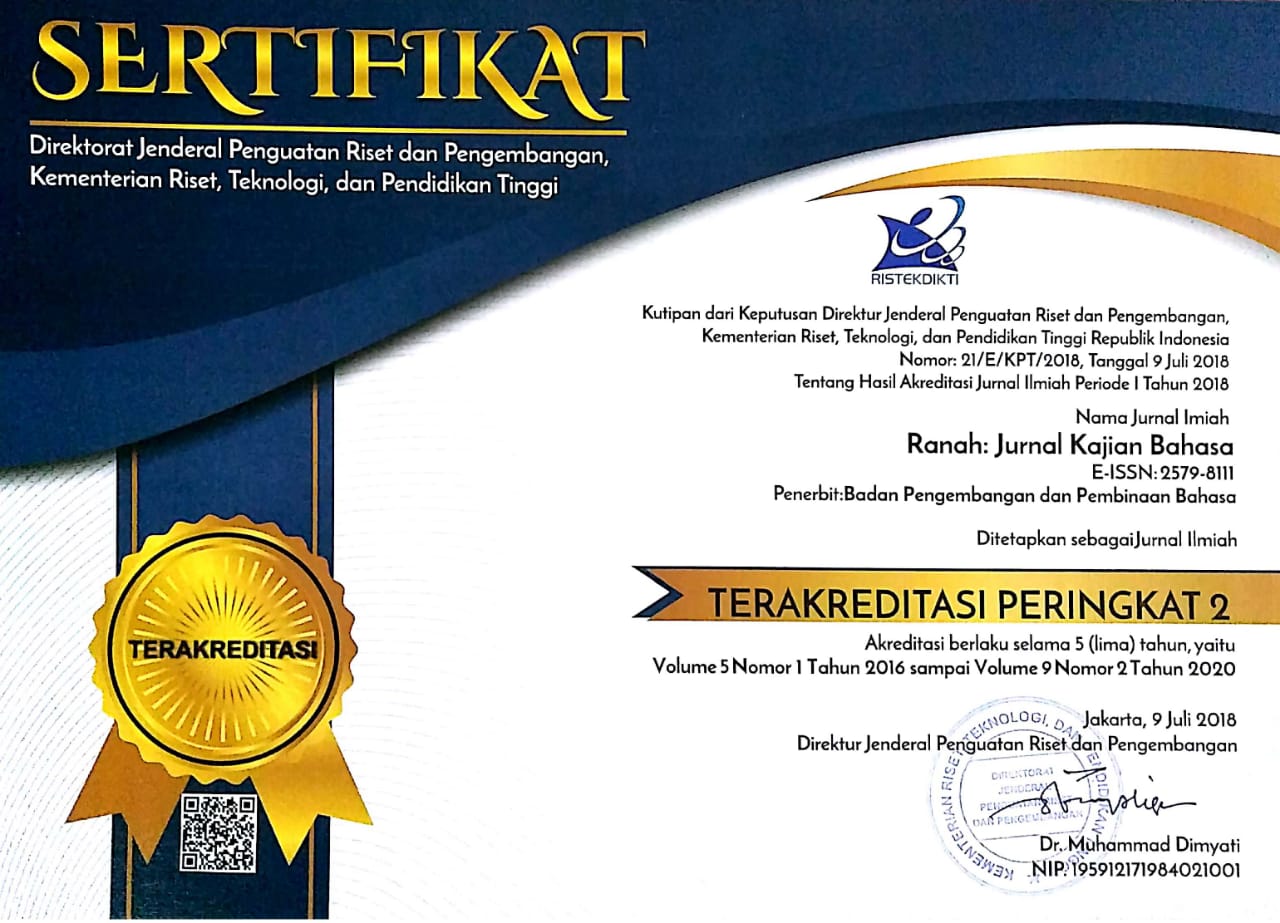EKSNOMINASI POLITIK DALAM NARASI: KONSEPTUALISASI PEMIKIRAN MITOLOGIS ROLAND BARTHES DAN IMPLIKASI METODOLOGISNYA DALAM KAJIAN SASTRA
Abstract
This article deals with Roland Barthes’ mythological thinking and its methodological implication in literary studies. Its basic thinking is that in various modes of representation exist the dynamics of mythical signification using denotative signification as its basic and aims to address particular message to readers or viewers. Such signification intertwines with the complexity of discourses, histories, knowledge, and problems in the real life. Its final goal is to depoliticize and ex-nominates making something nameless dominant political interest in narrative naturally. Barthes also conceptualizes an idea on second myth that uses (the first) myth as its basis of signifying process to subvert the dominant class’ political interest. For explaining the contributions of these two mythological perspectives in literary studies, I give conceptualize method of analysis using both of them. As concluding remarks, I position Barthes’ mythological thinking as a theoretical framework which can avoid literary studies from over intervention of outside-literary factors political economy, general theories, etc. that make the studies seem losing their narrative base. Because Barthes’ perspective emphasizes on reading of narrative dynamics without negating exploration of discursive richness in signifying process, naturalization of ideological discourses, and ex-nomination of particular political interest.
Abstrak
Tulisan ini membahas pemikiran mitologis Roland Barthes serta implikasi metodologisnya dalam kajian sastra. Inti dari pemikirannya adalah bahwa dalam beragam moda representasi berlangsung dinamika penandaan mitis yang menggunakan penandaan denotatif sebagai basisnya dan bertujuan menyampaikan pesan tertentu kepada pembaca ataupun penonton. Penandaan tersebut berjalin-kelindan dengan kompleksitas wacana, sejarah, pengetahuan, dan permasalahan dalam kehidupan nyata. Tujuan akhirnya adalah untuk mendepolitisasi dan mengeksnominasi menjadikan sesuatu tak bernama kepentingan politik dominan dalam narasi secara alamiah. Barthes juga mengkonseptualisasikan gagasan tentang mitos kedua yang menggunakan mitos (pertama) sebagai basis proses penandaan untuk mensubversi kepentingan politik kelas dominan. Untuk menjelaskan implikasi metodologis kedua perspektif mitologis tersebut dalam kajian sastra, saya mengkonseptuliasikan metode analisis dengan menggunakan keduanya. Sebagai simpulan, saya memosisikan pemikiran mitologis Barthes sebagai kerangka teoretis yang bisa menghindarkan kajian sastra dari intervensi berlebihan dari faktor-faktor di luar sastra faktor ekonomi-politik, teori-teori umum, dan lain-lain yang menjadikan kajian tersebut tampak kehilangan pijakan naratif. Karena perspektif Barthes menekankan kepada pembacaan dinamika naratif dalam kerangka penandaan tanpa mengabaikan eksplorasi kekayaan diskursif dalam proses penandaan, naturalisasi wacana ideologis, dan eks-nominasi kepentingan politik partikular.
Keywords
Full Text:
PDFReferences
Allen, Graham. (2003). “Structuralism”. Dalam Roland Barthes. London: Routledge.
Barthes, Roland. (1989). “The Structuralist Activity”. Dalam Davis Robert Con & Ronald Schleifer (eds). Contemporary Literary Criticism: Literary and Cultural Studies. New York: Longman.
Barthes, Roland. (1983). Mythologies. New York: Hill and Wang. Barthes, Roland. 1977. “Introduction to the Structural Analysis of Narratives”. Dalam ImageMusic-Text. London: Fontana Press.
Boggs, Carl. (1984). The Two Revolution: Gramsci and the Dilemas of Western Marxism. Boston: South End Press.
Castle, Gregory. (2006). “Marxist Theory”. Dalam The Blackwell Guide to Literary Theory. Malden (USA): Blackwell Publishing.
Daswani, Kavita. (2008). Pengantin Dusun di Berverly Hills (Terj. Gita Yuliani). Jakarta: Gramedia.
Eagleton, Terry. (2008). Literary Theory: An Introduction, Anniversary Edition. Minneapolis: University of Minnesota Press.
Eagleton, Terry. (1976). Marxism and Literary Criticism. London: Routledge.
Edgar, Andrew & Peter Sedgwick. (2002). “Barthes”. Dalam Cultural Theory: The Key Thinkers. London: Routledge.
Faruk. (2012). Metode Penelitian Sastra: Sebuah Penjelajahan Awal. Yogyakarta: Pustaka Pelajar.
Fiske, John. (2002). Television Culture. London: Routledge.
Gramsci, Antonio. (1981). “Class, Culture, and Hegemony”. Dalam Tony Bennett, Graham Martin, Collin Mercer, & Janet Woolacott (eds). Culture, Ideology, and Social Process. Batsford: The Open University Press.
Habib, M.A.R. (2005). “Marxism”. Dalam A History of Literary Criticism: From Plato to the Present. Malden (USA): Blackwell Publishing.
Hall, Stuart. (1997). “Gramsci’s relevance for the study of race and ethnicity”. Dalam David Morley & Kuan-Hsing Chen (eds). Stuart Hall, Critical Dialogue in Cultural Studies. London: Routledge.
Howson, Richard & Kylie Smith. (2008). “Hegemony and the Operation of Consensus and Coercion”. Dalam Richard Howson & Kylie Smith (eds). Hegemony: Studies in Consensus and Coercion. London: Routledge.
Marx, Karl & F. Engels. (2006). “The Ruling Class and the Ruling Ideas”. Dalam Meenakshi G. Durham & Douglas M. Kellner (eds). Media and Cultural Studies Keyworks. Victoria: Blackwell Publishing.
Munif, Achmad. (2005). Cinta Oh Cinta. Yogyakarta: Binar Press.
Sunardi, ST. (2004). Semiotika Negativa. Yogyakarta: Penerbit Buku Baik.
Tyson, Lois. (2006). “Marxist Criticism”. Dalam Critical Theory Today, User-Friendly Guide (Second Edition). London: Routledge.
Williams, Raymond. (2006). “Base/Superstructure in Marxist Cultural Theory”. Dalam Meenakshi Gigi & Douglas M. Kellner (eds). Media and Cultural Studies KeyWorks. Victoria: Blackwell Publishing.
DOI: https://doi.org/10.26499/jentera.v3i1.430
Refbacks
- There are currently no refbacks.






















